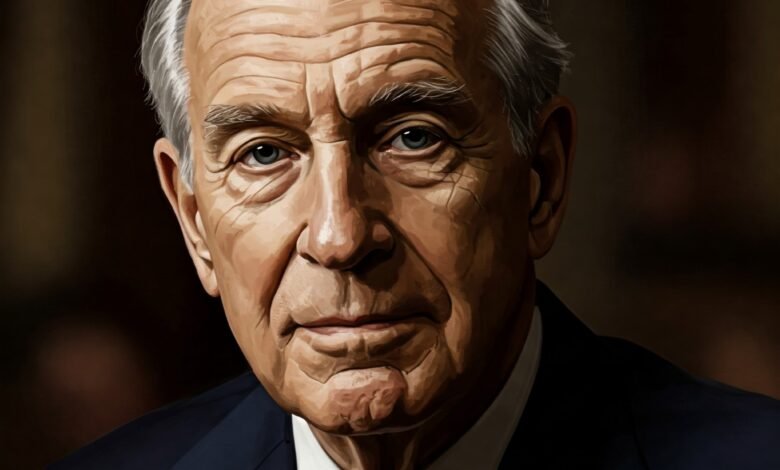The Life and Legacy of Richard Joseph Durbin

Early Life and Education
Richard Joseph Durbin was born on November 21, 1945, in East St. Louis, Illinois. Growing up in a modest family, he was the second of four children to his parents, both of whom placed a strong emphasis on the values of hard work and education. His father, a businessman, and his mother, a homemaker, instilled in him the importance of civic responsibility and community involvement from a young age.
Durbin’s formative years were spent in the vibrant atmosphere of East St. Louis, where diverse cultural influences enriched his upbringing. The challenges faced by his community exposed him to socio-economic issues, which would later shape his political ideology. He attended high school at East St. Louis Senior High School, where he distinguished himself as a diligent student and an active participant in student government. His early leadership experiences would later serve him well in his political career.
Upon graduating from high school in 1963, Durbin pursued higher education at the University of Illinois at Urbana-Champaign. There, he majored in political science, which further fueled his passion for public service. His college years were marked by involvement in various student organizations and initiatives aimed at promoting civil rights and social justice, reflecting the political climate of the 1960s. It was during this time that he began to formulate his views on government and social policy.
After obtaining his bachelor’s degree in 1969, Durbin continued his education at Georgetown University Law Center, where he earned his Juris Doctor in 1972. The rigorous academic environment, coupled with his commitment to public service, paved the way for his future in politics. His early life and education played a crucial role in shaping the values he would carry throughout his career, guiding him in his relentless pursuit of equity and justice for all citizens.
Political Career Beginnings
Richard Joseph Durbin, an influential figure in American politics, began his political journey with a deep commitment to public service. He entered the political arena in 1982 when he was elected to the Illinois State Senate. His decision to pursue a career in politics was primarily motivated by his desire to create meaningful change within his community. Durbin’s formative years were marked by his experiences as a law student and the challenges he faced while working in various capacities, which significantly shaped his political philosophy.
Durbin’s advocacy for the rights of the underserved became a cornerstone of his early political platform. He often addressed issues such as healthcare access, education reform, and social justice, positioning himself as a champion for those who felt marginalized. His initial foray into politics was not without obstacles; as a newcomer, he faced skepticism from both political establishments and constituents. However, his diligence and sincere dedication to his constituents’ needs helped him gain traction and build a loyal support base.
One of Durbin’s early achievements in the State Senate was his involvement in legislation that aimed to improve the education system in Illinois. This endeavor not only showcased his capability to navigate complex legislative procedures but also highlighted his focus on the long-term benefits of quality education. Durbin’s progressive stances, along with his ability to unite people around shared objectives, laid a solid foundation for his future political career.
His early experiences in state politics equipped him with the skills necessary for broader responsibilities. With a firm understanding of the legislative process and an unwavering commitment to public service, Durbin was poised for greater challenges on a national scale. His journey exemplifies the blend of determination and altruism that characterizes successful public servants, setting the stage for his subsequent endeavors in Congress.
Tenure in the U.S. House of Representatives
Richard Joseph Durbin served as a member of the U.S. House of Representatives from 1983 to 1997, representing Illinois’ 20th congressional district and subsequently the 17th congressional district. During this period, he established himself as a prominent figure within the Democratic Party and garnered a reputation for his commitment to various legislative issues including health care, education, and civil rights. His tenure in the House was marked by key contributions that not only influenced local constituents but also had national implications.
One of Durbin’s defining legislative efforts was his involvement in the fight for comprehensive health care reform. He was an ardent supporter of initiatives aimed at increasing access to affordable health care. His work on the Health Security Act in 1993 showed his dedication to reforming the American health care system, although it ultimately faced significant challenges in Congress. Additionally, Durbin played a crucial role in education policy, advocating for increased funding for public schools and higher education. His focus on educational reform reflected his belief in the necessity of accessible and quality education for all Americans.
Durbin’s committee assignments further cemented his stature within the legislative landscape. He served on several influential committees, including the Judiciary Committee, where he took part in discussions surrounding significant legal reforms and civil liberties. His leadership on these committees allowed him to spearhead initiatives that addressed pressing issues, such as gun control and voting rights, positioning him as a key advocate for social justice. Throughout his time in the House, Durbin’s ability to forge bipartisan alliances helped him effectively champion numerous legislative initiatives, underscoring his adeptness in navigating the complexities of political discourse within Congress.
Transition to the Senate
Richard Joseph Durbin’s ascension to the United States Senate in 1996 marked a significant transition in his political career. Following his tenure in the House of Representatives, where he served from 1983 to 1997, Durbin leveraged his extensive experience to compete for the Senate seat previously held by the retiring Senator Paul Simon. His deep understanding of legislative processes, acquired during his years in the House, provided him with a robust foundation for his new role in the upper chamber of Congress.
Durbin won the Democratic primary with a decisive margin, which was followed by a successful campaign against Republican candidate Al Salvi in the general election. During his initial years in the Senate, he quickly established himself as a voice for key issues, including healthcare and education. His experience in the House was instrumental in allowing him to navigate the complexities of Senate procedures, an ability that would serve him well throughout his career.
As a senator, Durbin took on several leadership roles, including serving as the Senate Minority Whip, where he was responsible for rallying Democratic support and facilitating bipartisan negotiations. His capacity to communicate effectively and build consensus among his peers has been vital in shaping policy on a national level. Notably, Durbin’s efforts on immigration reform and gun control highlight his commitment to addressing pressing issues facing the country. Through his legislative initiatives, he has sought to impact American lives while also influencing broader policy discussions.
Durbin’s transition to the Senate has not only amplified his voice but has also enabled him to serve as a key leader within the Democratic Party, guiding important legislative efforts and advocating for the interests of his constituents in Illinois and beyond.
Key Legislative Achievements
Richard Joseph Durbin, a veteran member of the United States Senate, has made significant contributions to a variety of legislative initiatives throughout his extensive career. As a key figure in shaping policies, Durbin’s work has had a profound impact on healthcare, education, and immigration reform, among other vital areas. His commitment to public service has seen him advocate for laws that enhance the quality of life for millions of Americans.
One of Durbin’s notable legislative achievements is his pivotal role in the passage of the Affordable Care Act (ACA) in 2010. This landmark healthcare reform aimed to reduce the number of uninsured individuals and improve access to health services. Durbin was instrumental in championing provisions that expanded Medicaid, ensuring that vulnerable populations received critical healthcare support. His efforts have contributed to significant improvements in public health outcomes and have reduced the financial burden on many families.
In the area of education, Durbin has consistently fought for increased funding and resources to improve public schooling and higher education access. He was one of the driving forces behind the reauthorization of the Higher Education Act, which enhances federal student aid programs and seeks to make college more affordable for disadvantaged students. His advocacy for financial aid reform has helped countless individuals achieve their academic goals, promoting equity in education.
Furthermore, Durbin has been a longstanding advocate for comprehensive immigration reform. He has worked on various legislative efforts to create pathways to citizenship for undocumented immigrants and to protect vulnerable groups, such as DACA recipients. Through these initiatives, Durbin has aimed to create a more just and fair immigration system, recognizing the contributions of immigrants to the social and economic fabric of the nation.
Overall, Richard Durbin’s legislative achievements reflect his dedication to addressing critical issues that resonate with constituents across Illinois and the entire nation. His work has left an indelible mark on various policy areas, enhancing the lives of many through his tireless advocacy and leadership in the Senate.
Political Philosophy and Values
Richard Joseph Durbin, a prominent figure in American politics, has always emphasized a set of core values that effectively shape his political philosophy. As a long-serving member of the United States Senate, Durbin has held steadfast to principles that resonate with his constituents and reflect his dedication to public service. His political ideology is primarily rooted in a commitment to social justice, equality, and the protection of individual rights, which informs his approach to a myriad of legislative issues.
Durbin’s stances on various policies are indicative of a progressive framework. He advocates for affordable healthcare, evidenced by his support for the Affordable Care Act, emphasizing the belief that access to quality healthcare is a fundamental right. Moreover, Durbin is a strong proponent of education reform, seeing it as a pathway to opportunity and economic mobility for all citizens. His advocacy for public funding of education, increased investment in early childhood programs, and support for student loan forgiveness demonstrates his commitment to ensuring that all individuals have access to the tools for success.
In terms of social justice, Durbin has been a consistent voice in Congress against discrimination and inequality. He champions initiatives aimed at protecting the rights of marginalized communities, and his legislative efforts often target systemic injustices. This commitment extends to issues such as immigration reform, where he supports humane policies that uphold the dignity of individuals seeking a better life in the United States.
Moreover, Durbin’s collaborative approach to governance is a hallmark of his political values. He believes that constructive dialogue across party lines is essential for effective policymaking. This philosophy is reflected in his role as a leader, where he navigates complex political landscapes to find common ground, thereby fostering a more inclusive and equitable legislative process. Such principles guide Durbin’s actions and interactions with constituents and colleagues alike.
Impact on Illinois and National Politics
Richard Joseph Durbin, a longstanding figure in American politics, has played a vital role in shaping both Illinois and national political landscapes. As a Democratic senator since 1997, Durbin’s influence has extended beyond local governance to affect policies that resonate on a national scale. His legislative priorities have often emphasized the importance of healthcare, education, and economic justice, which have collectively impacted the state’s socio-economic fabric.
In Illinois, Durbin’s commitment to advancing public welfare is evident through his support of initiatives aimed at boosting education funding and improving access to healthcare services. His advocacy for the Affordable Care Act significantly improved health outcomes for thousands of Illinois residents, cementing his status as a key player in the healthcare reform movement. Furthermore, Durbin’s efforts to secure federal funding for infrastructure projects have not only sponsored job creation but have also enhanced the quality of life for constituents across the state.
On a national level, Durbin’s role as the Senate Minority Whip has positioned him as a leading advocate for policy alignment within the Democratic Party. His legislative strategies often contribute to broader party agendas, especially in areas concerning immigration reform and economic recovery. Durbin’s influence extends into critical areas where bipartisan support is necessary, fostering dialogues that address pressing concerns affecting diverse American communities.
Durbin has also championed civil rights and equality, positioning himself as an advocate for marginalized groups, which has made him a prominent voice in national discussions on social justice. His work on issues like gun control and climate change demonstrates a commitment to progressive values while promoting dialogue between differing political factions. The significance of Richard Durbin’s contributions cannot be overstated, reflecting a legacy that has indelibly impacted both Illinois and national politics.
Legacy and Future Directions
Richard Joseph Durbin has solidified his place in the annals of American politics through a dedication to public service that has spanned several decades. As a prominent figure in the Democratic Party and a long-serving member of the Senate, Durbin’s legacy is marked by his advocacy for comprehensive healthcare reform, social justice, and economic equality. His peers often commend him for his pragmatism and ability to engage in productive dialogues across party lines, making him a respected voice in legislative discussions.
Historians and political analysts view Durbin as a pivotal player in shaping modern Democratic ideology. His proactive stances on pertinent issues such as immigration reform, gun control, and civil rights have not only garnered him respect but also significant criticism, highlighting the polarized nature of contemporary politics. Nevertheless, many constituents appreciate his commitment to representing their interests and ensuring that vital issues remain on the national agenda.
As he continues to serve, there is potential for Durbin to expand his influence even further. With a growing emphasis on technology, environmental issues, and diverse representation in government, his ability to adapt to changing political demands will be crucial. He is in a unique position to mentor the next generation of leaders within the Democratic Party, potentially guiding them toward a more inclusive and effective approach in addressing the challenges of tomorrow.
Moreover, the ongoing relevance of Durbin’s contributions cannot be overstated. His legislative achievements serve as a foundation for future discussions on public policy and reform, critical in an increasingly complex societal landscape. As such, the legacy of Richard Joseph Durbin will likely remain influential for years to come, embodying the ideals of a dedicated public servant committed to the betterment of American society.
Conclusion: A Profile in Leadership
Richard Joseph Durbin has established himself as a significant figure in American politics, demonstrating a steadfast commitment to public service throughout his career. As a member of the U.S. Senate since 1997, Durbin has worked diligently to champion a variety of issues that resonate with the core values of democracy and equity. His approach to leadership emphasizes a collaborative ethos, seeking to bridge divides and foster bipartisan solutions. This dedication to unity and constructive dialogue serves as a vital lesson for both current and future leaders.
One of Durbin’s hallmark legislative achievements is his focus on social justice and healthcare reform. He has been an unwavering advocate for programs intended to support the underprivileged and ensure access to essential services. His work reflects a profound understanding of the intricate relationship between policy decisions and their real-world impacts on communities. This ethos of empathy and responsibility in governance is a legacy that aspiring politicians should strive to emulate.
Durbin’s ability to address critical issues, from immigration reform to gun control and climate change, illustrates his versatility and responsiveness to the pressing needs of the society he represents. As he navigates the complexities of modern governance, his commitment to integrity and accountability remains steadfast. Importantly, his influence extends beyond the Senate floor, inspiring a new generation of political leaders committed to public service and ethical leadership.
In summary, Richard Joseph Durbin’s life and career offer an exemplary model of principled leadership. His focus on collaboration, empathy, and public welfare serves as a guiding light for those in positions of power. As we reflect on his contributions, it becomes clear that Durbin’s legacy will continue to shape the landscape of American politics for years to come, influencing both policy and the moral compass of those who seek to serve the public. His commitment to serving the common good is a timeless message that resonates with citizens and politicians alike.























